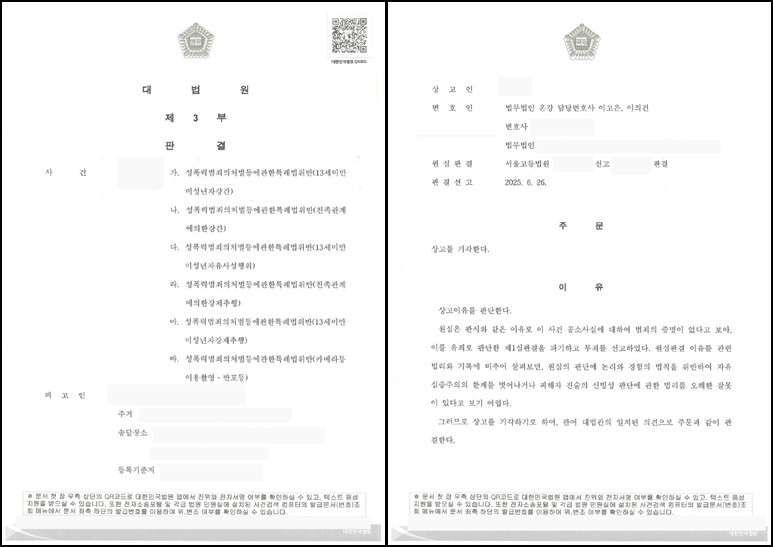Overview of the case (facts)
The client had lived with the victim, who was related to him since childhood, and was charged with six serious counts of committing sexual offenses against her over a period of years. Based on the victim's testimony, the trial court sentenced the client to 15 years in prison.
The client, who was on the verge of losing everything, sought out our firm for a last-ditch appeal and, with our assistance, was acquitted of all charges.
However, the prosecutor disagreed and appealed to the Supreme Court, which was the final hurdle in a long legal battle.
Case Issues (Case Features)
The credibility of the victim's testimony was a key issue in the case, as the victim's testimony was virtually the only evidence in the case, with no objective evidence. In particular, in the Supreme Court appeal, the key to the final judgment was whether the Court of Appeals (2nd instance), which acquitted the defendant, misunderstood the law or went beyond the limits of liberal psychology.
Assistance from the warm river
Our defense team focused its arguments on strengthening the logic that led to the acquittals at the second trial and making it clear to the Supreme Court that the prosecution's reasons for appeal were legally unjustified.
1. Point out the legal limitations of the prosecutor's argument
The Supreme Court is a court of law that deals with issues of law, not facts. Onkang strongly argued that the prosecutor's grounds for appeal are merely 'mistake of fact' arguments, meaning that the trial court's selection of evidence and recognition of facts were wrong, which cannot be a legitimate ground for appeal under the Criminal Procedure Act, which clarifies that the Supreme Court should not re-determine the facts unless there is a grave violation of law in the appellate decision.
2. reaffirmed the contradictions and inconsistencies of the victim's statement with objective evidence
Rebutted the prosecutor's arguments point by point and reiterated the unreliability of the victim's statement.
(1) Inconsistency of statements:
We pointed out that the time period of the crime as stated by the victim and the time of the crime as stated in the indictment are clearly contradictory in the time series. It was logically explained that even according to the victim's statement, the period of the crime cannot be matched with the time of the indictment if the period of the crime is calculated backwards.
(2) Confrontation with objective evidence:
The client's absence from the country on the date of the specific offense was proven through immigration records, indicating that he was physically unable to commit the crime.
As for the location of the crime, the victim impeached the credibility of the testimony by proving through objective evidence that the people involved were living in a different area at the time.
(3) Emphasizing the careful judgment of the Appeals Chamber:
Onkang's defense counsel emphasized that the Appeals Chamber made every effort to discover the substantive truth by reopening the case twice, interviewing victim witnesses, and issuing discovery orders.
This was an important argument to the Supreme Court that the trial court's acquittal was not a light or arbitrary decision, but rather a reasoned conclusion reached after a thorough hearing.
Results
The Supreme Court rejected the prosecutor's appeal, finding that "it is difficult to see that the trial court's judgment violated the rules of logic and experience, departed from the limits of liberal psychology, or misunderstood the law on determining the credibility of victims' statements."
This resulted in a complete exoneration of our client, who fought with us in a hopeless situation of 15 years in prison in the first trial.
[Judgment].

See also the success story below, in which Ong Kang's skillful advocacy overturned a 15-year prison sentence in the first trial and secured a full acquittal in the second trial.



